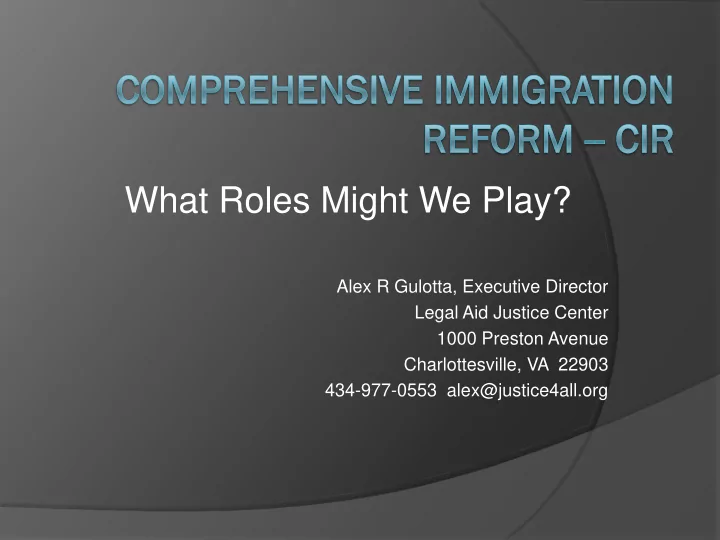

What Roles Might We Play? Alex R Gulotta, Executive Director Legal Aid Justice Center 1000 Preston Avenue Charlottesville, VA 22903 434-977-0553 alex@justice4all.org
The Landscape is Uncertain . . . � Currently the exact role of LSC programs in representing persons impacted by CIR is uncertain. � The ability for LSC programs to participate in the areas listed below will remain ambiguous until the final bill becomes law. � Some portion of each of the activities listed below likely will be permissible, at least with regard to the subset of individuals eligible for LSC funded services. � Once the bill is final we should work with NLADA to help define the permissible parameters of our work. � Your board may need to review or revise priorities to allow for this representation.
What will CIR look like? � Status is uncertain; something, sometime?! � S. 744 is the Senate version � NILC has decent summaries � http://www.nilc.org/irsenateS744faq.html � http://www.nilc.org/s744goodbadtable.html
As A Convener . . . � Most work in the area of CIR is likely to be regional or statewide with a number of interested providers. � Due to the legal nature of the work needed to implement CIR, and the fact that we are part of statewide justice communities, we are uniquely positioned to exercise a leadership role in CIR implementation efforts. � Coalitions need coordination – a conference bridge, a listserv, a person ‐ in ‐ charge, a cat herder – and we can play that role particularly if we are connected to the communities impacted.
As A Trainer of Trainers . . . � As CIR unfolds, there will be a huge need to interpret and simplify the parameters of the law for other service providers and for the affected communities. � Information from the national sources (NILC, etc.) will need to be personalized to your region or state and linked to the available resources. � As new guidance is released, we can take charge of digesting it and pushing it out to our partners in the coalition. � We can develop best practices and a system for distributing them to our community partners.
As Technical Assistance . . . � Many immigration providers use non ‐ attorney advocates to process immigration applications. � Legal aid programs can develop collaborative projects with immigration assistance providers to provide on ‐ call technical assistance to partner advocates. � Some programs may choose to take referrals of the tough cases, those at the margins, that may require a higher degree of legal differentiation, background work, or finesse. � We can play a significant role in the development and/or interpretation of regulations and policy directives.
As A Frontline Provider . . . � Particularly in areas outside of cities, where non ‐ profit immigration assistance providers are scare, we can provide direct services to client communities impacted by CIR. � The proverbial “floodgates” can be controlled by case acceptance guidelines that narrow the funnel to acceptable levels; such guidelines could take a variety of forms so as to target limited resources. � Clinics and other forms of limited assistance also may be effective models with appropriate support and follow ‐ up assistance. � Pro bono is another potential resource – possibly as a signature project of a state ‐ wide or specialty bar.
Indirectly . . . � Even if immigration related services are – and will remain – outside your purview, CIR will bring millions of low ‐ income families and individuals “out of the shadows.” � Your state CIR coalition needs to know what you can do – and for whom. LSC ‐ ineligible parents may have US citizen children with unmet legal needs appropriate for referral to your offices. � The level of blatant, shocking, legal abuse of undocumented workers and their families is appalling; many households are of mixed status and some viable legal claims may be brought by LSC ‐ eligible household members. � Notario abuse will be rampant – creating opportunities for important consumer work and administrative advocacy.
Feel Free to Contact Me: Alex R Gulotta, Executive Director Legal Aid Justice Center 1000 Preston Avenue Charlottesville, VA 22903 434-977-0553 alex@justice4all.org
Recommend
More recommend